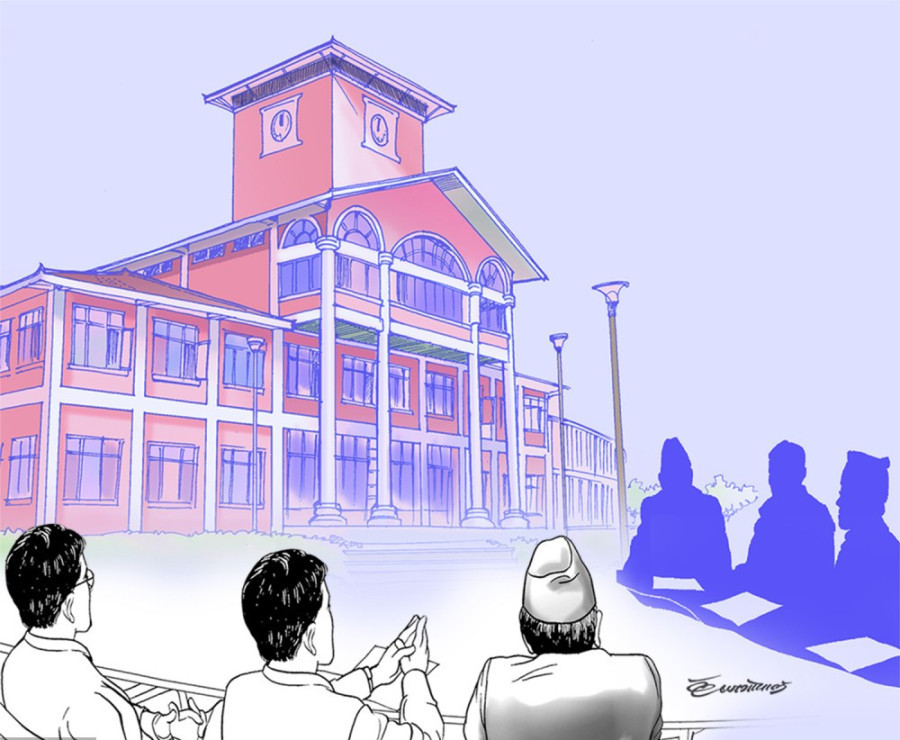Editorial
Divide and ruin
Whatever the top politicians might say, the system of ‘bhagbanda’ in our universities continues to flourish.
For years, politics has taken precedence over progress in Nepal’s higher education. Political parties have turned educational institutions into their playgrounds, weakening the foundation and values of these establishments. This is evident in the recent hullabaloo over the appointment of deans at Tribhuvan University (TU), Nepal’s oldest. The dean positions were vacant since June this year, and disagreements in the executive council over the selections had hindered the selection process before Dashain. The major political parties and their student unions did their best to manipulate the merit-based appointment system, while criticising each other for ‘politicising’ higher education. The tug-of-war between the parties finally ended with the appointment of deans in five study institutes and three faculties of the university. However, these appointments have once again laid bare the practice of bhagbanda between the CPN-UML, the Nepali Congress, and the CPN (Maoist Centre).
For fair selection, the executive council issued procedures for appointing deans and formed recommendation committees to suggest candidates based on merit. However, these committees have no more than symbolic value in a country where corruption seeps into the very systems intended to eradicate it. When vice-chancellor Keshar Jung Baral tried to appoint the deans and campus chiefs based on “meritocracy”, the recommendation committee did not rank professors affiliated with the UML on top. This did not please the UML and Baral was criticised at the University’s senate meeting. Although the UML’s protest reflects its vested interests, Baral’s claim of merit-based dean recommendation is contaminated by his own controversial past, raising doubts over his intent. In February, then-Prime Minister Pushpa Kamal Dahal had appointed Baral as vice-chancellor even though he was second in line after Chitra Bahadur Budhathoki.
To sum up, meritocracy was seen only on paper, as wherever there was political interest, selections weren’t based on merit. Ultimately this time, three Congress-affiliated professors, and two each from the UML and the Maoist Centre, were appointed deans, in addition to one with no clear political ties. It is now well established that politicisation of higher education does a lot of harm. Once renowned for its academic excellence, India’s Jawaharlal Nehru University has devolved into a hotspot for political unrest, with strikes and protests harming its academic standing. Similarly, Karachi University in Pakistan has suffered a lot from political polarisation, resulting in on-campus violence and administrative blunders.
The logic is straightforward: Those who have mastered academia are best equipped to understand and manage educational institutions. However, such reasoning does not work in Tribhuvan University, where the chancellor, the highest-ranking official in the university, is the prime minister. Although the universities’ laws authorise the prime minister, as an ex-officio chancellor, to appoint vice-chancellors from among the three names recommended by the search committees, the prime minister typically appoints individuals aligned with their party, triggering a domino effect that ultimately undermines the merit-based system. Such unnatural appointments to major positions in educational institutions in turn disrupt the university’s intellectual ecosystem.
It is high time we got to the root of politicisation of education and nipped it in the bud. The political parties cannot be allowed to use educational institutions as an extension of party organisations and risk the future of hundreds of thousands of students. At a time when we are witnessing a mass exodus of students due to their increasing distrust in our higher education, political parties must step aside and allow those who understand the institutions the best to lead. It is about time we created an education system that works for the benefit of students rather than politicians.




 10.12°C Kathmandu
10.12°C Kathmandu














